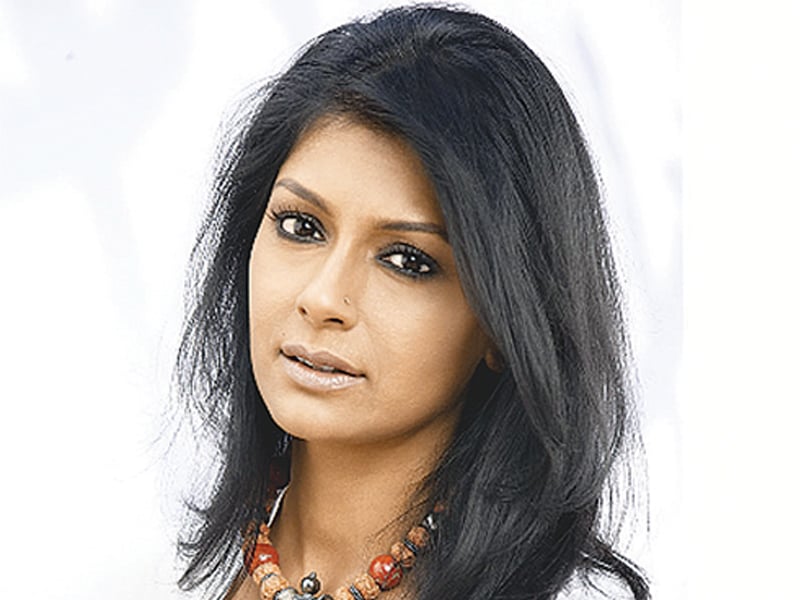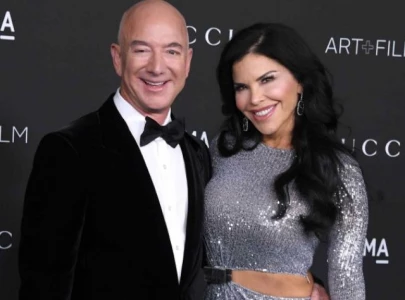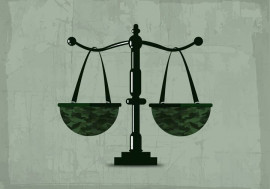
The new poster girl of the "Dark is Beautiful" campaign, Nandita Das, has called out India's obsession with fair skin - a prejudice she says has driven some young women to the brink of suicide.
"Magazines, TV, cinema - everywhere being fair is synonymous with being beautiful," Das told AFP.
Described as having "dusky" skin as opposed to a fair complexion, the 43-year-old is well used to Indian preoccupations with colour, and not just in the film industry, where she has refused requests to lighten her skin for roles.
"How can you be so confident despite being so dark?" is a question regularly asked of Das, who has preferred to star in unconventional, issue-based films but says she would struggle to get ahead in mainstream Bollywood movies.
In May, Das became the face of the Dark is Beautiful campaign, launched in 2009 by activist group Women of Worth to celebrate "beauty beyond colour".
Her backing has helped to generate increasing debate in the media, but the response has underlined just how ingrained the preference is for fairer skin, which has long been associated with higher social classes and castes.
"I started getting tonnes of emails from young women pouring their heart out about how they were discriminated against. Some wanted to commit suicide because they couldn't be fair," she said.
Das found her own photograph had been lightened by a newspaper even for a feature on the campaign. When looking for a nanny, she was told one candidate was "good, but quite dark".
Amid such pressures to be pale, India's whitening cream market swelled from $397 million in 2008 to $638 million over four years, according to market researchers at Euromonitor International.
Skin-lightening products accounted for 84 percent of the country's facial moisturiser market last year, their report shows.
The bias facing darker-skinned women was raised again in September when an Indian-origin woman, Nina Davuluri, won the "Miss America" contest in the United States.
"Had she been in India, far from entering a beauty contest, it is more likely that Ms Davuluri would have grown up hearing mostly disparaging remarks about the colour of her skin," said an editorial in The Hindu newspaper.
"She would have been - going by the storyline of most 'fairness' cream advertisements - a person with low self-esteem and few friends."
Last year, a commercial for an "intimate wash" to whiten vaginas emerged, showing a young Indian woman who uses the product to successfully regain her boyfriend's attention.
The advert was widely panned, but a glance through matrimonial websites and newspaper columns suggests that fair skin, at least on a woman's face, remains key to attaining an Indian husband.
Aspiring grooms often state in their adverts their preference for a fair bride, while nearly all women's profiles describe their complexion as fair or so-called "wheatish".
Ekta Ghosh, a fashion designer in Mumbai who specialises in wedding wear, said the message that only fair is beautiful had been passed down to Indian girls for generations.
"Parents, relatives, they all keep saying you should do something to lighten your skin tone," she said.
India's mass market whitening pioneer was "Fair & Lovely", launched in 1975 by Hindustan Unilever and now selling in a range of other countries where pale skin is desirable, across Africa and the Middle East as well as Asia.
Indian consumer group Emami later came up with "Fair and Teen" for girls and "Fair and Handsome" for men.
Promoted by Bollywood superstar Shah Rukh Khan, the latest advert shows him tossing a tube of the cream from the red carpet to a young male fan.
Dark is Beautiful has launched a petition against the "irresponsible" video and its message that "fair skin is a prerequisite for success".
So far more than 15,000 people have signed up in protest, but Khan has not responded.
"You're telling people they're just not good enough," said Das, who describes whitening cream adverts in general as "so regressive and derogatory".
Fairness cream producers suggest they help to boost users' confidence, although both Emami and Hindustan Unilever declined to comment for this article.
Not everyone, however, is convinced such creams are even effective.
Receptionist Prachi Chawan, 28, said she had been using Fair & Lovely products for three years "out of habit", but was yet to see noticeable results.
"There have been no side effects but no change either," she said.
Das believes whitening cream developers did not create Indians' colour bias and insecurities, but have "cashed in" on it, creating a "vicious circle".
While men's fairness products are gaining ground, the actress says women and girls still face far more pressure over their skin tone, which she puts down to a general lack of respect and inequality.
"Until we let women have the same space as men and treat them as human beings, all this will carry on."
COMMENTS (28)
Comments are moderated and generally will be posted if they are on-topic and not abusive.
For more information, please see our Comments FAQ





1725254039-0/Untitled-design-(24)1725254039-0-270x192.webp)

















@Shahbaz: your opinion. Apparently many think fair skinned models are very beautiful and nobody comes close to them.
@Vineeth: there were Hindu gods and goddesses were and are fair skinned. And this preference has been around for a long time. Way before western invasion.
@Parvez: this was happening before Gora invasion:/ preference for fair skin has been around for a long time. And obvisouly beauty is in the eye of beholder. You like dark skinned women but somone else thinks dark skin does not even come close to fair skinned women/models as you can see.
@Indigenous: @FAZ: @Truth Detector: Thanks for your wishes!!! Love (or a matter of fact beauty) should not be skin deep I can say with conviction (and now with experience)......
I agree with Indigenous "I sometimes think, we Indians must be the greatest racists of all." I work with and UN agency and our previous boss was from Nigeria. One day he told me in extreme pain "You know, I have worked in every part of world including US and Europe, but was never insulted for my skin colour. But in India I have been called Blacky several times on my face"..........
Nandita for President !!
@Indian Wisdom: Beautiful anecdote!
@Dr Dang: I can understand your plight because I'm a fair skinned person in the state of Tamilnadu where around 70% of them are having darker skin...I get irked when people tell me "I thought you were a brahmin" "How come you speak tamil so fluently?"
The worst of all is that they import heroines from North with Milk fair skin like Tamanna,Kajal Agarwal,hanskika Motwani etc in Tamil movies taht too in roles involving the characters of a village belle... That looks as ridiculous as casting Brad Pitt as Martin Luther King....
I dont know how much Pakistanis in general are about the skin color but I've seen many Pakistani trolls in TOI commenting "Blackie Indians" as if they are as fair as Scandinavians....Honestly,I would love to be a black,especially in certain part of my anatomy ;)
@Dr Dang: I empathize with you a lot. However I am a fair-skinned Indian. I mean, I am the kind of guy who sometimes walks downtown in India and people ask me "Dollar, dollar?".
I sometimes think, we Indians must be the greatest racists of all.
PS: I am not bringing in Pakistan at all into this as I have related my experiences to within India and none relating to Pakistanis abroad on my personal experience. However I do cringe whenever hear one of them say "gora".
@Indian Wisdom: Its good that you got so called dumped. For people whose love is skin deep, faithfulness can be always questionable! Fair skin syndrome in east and tanned skin in west! I guess we are never satisfied with what we have.
I have not visited India, but do know many Indian females, who, to me, are usually very attractive regardless of their skin colour, which together with pleasant personalities make them a very good catch. They are also, without exception, very good at housekeeping and cooking even when they have professional occupations. As a general rule I do not think that Indian women would have too many problems getting by in most Western countries as a result of their skin colour. Also, to me, Nandita Das is absolutely gorgeous
I think same problem can be seen in Pakistan too. People are overly obsessed with fair color & don't hesiate to comment on people's color. This is a shameful cultural norm. I think we , South Asians are more racist than wetsern countries.
@Indian Wisdom. Happy for you. Best wishes.
ETBLOGS1987
@fatima wahab: My guess is that Fair and Lovely must be a sun screen cum moisturiser, so it would prevent tanning allowing a person to regain their natural color which most may never have seen due to constantly being out in the sun unprotected. Other than that you are quite right of course. The natural colour cannot be lightened.
Plus the more important point is the one Nandita Das is making i.e. it should not matter. So kudos to her for agreeing to be the face of this campaign.
I disagree with tThe Hindu statement about Neena Kovaluru. I mean Sushmita Sen did become Miss India and went on to become Miss Universe and she is not fair either. Rekha, Bipasha Basu are other examples of dusky ladies that are higly succesful in commercial Bollywood where looks count. This is not to say such biases do not exist but they are more likely instilled by one's own families. If the families do not dishearten the girls, the world outside will not really discriminate as much.
The Information & Broadcasting ministry in India is a joke. As a dark skinned Indian, I get offended everytime i see these ridiculous ads on TV. whether its a movie star selling them or some fair skinned model telling me how she found love, job & happiness once her skin became lighter in tone after using the product.In a country where its citizens forever crib about racism when overseas, Indians seem to be perfectly OK with these products being sold in their own country. The I & B ministry has problems with alcohol adverts but no problems with these racist products being openly advertised on TV. SAD
Pakistan also needs to launch a similar campaign. All products for such products link fairness with success which is discriminatary and should be outlawed.
Just remembered the song from old Bollywood movie "Gumnaan".
"Hum Kale Hai to Kya Hua Dil Wale Hai......................."
Its a belief with which most people agree. The first time i visited Ethiopia,i was amazed at the beauty of the girls of that nation and yes they were dark .
Well fair is beautiful. Live with it. No offence to dark people like myself.
I completely support this campaign, the obsession with fair skin is a big dilemma in Pakistan, too. Dark skin eats the confidence of our young girls from within. Our society, and the general commentary on their skin colour creates doubts in minds whether they will be able to get success and good husband.
@fatima wahab:
Yes, these creams effectively bleach your skin, which makes them harmful, and the whitening effect is only temporary until new cells start growing again.
Also, it's kind of ironic that the picture of Nandita Das in this article shows her clearly wearing heavy foundation on her face.
@ Pervez ,wholly agreed Nandita Das is not only gorgeous and extremely pretty she possess the intellect to go with it .
Similarly , if you you see Pakistani model the dusky beauty Iraj Manzoor , no fair skinned model comes even closer to her .
Respect for Nandita Das.
The gora is a very intelligent creature. The story goes that a British civil servant in his report from India said words to the effect ' that if we are to suppress and rule these people we must first and foremost formulate a strategy by which they are made to feel inferior to us '.........and they succeeded. Now to more serious matters, Nandita Das in my view is more than just amazingly good looking, no gori even comes close.
Nice but, too little too late..it has already penetrated to the core of people mind and how they perceive the 'snow white' of their dreams!! I think It can never be just washed cleaned.
Um... skin complexion has to do with the amount of melanin in your skin. It's not medically possible to change it so companies like Uniliver that sell fairness creams are basically lying. In any country with stronger laws, this would have been challenged under false advertisement. In countries like Pakistan and India, no one questions it :\